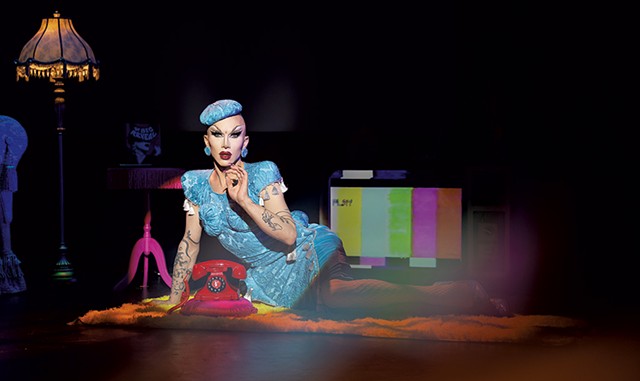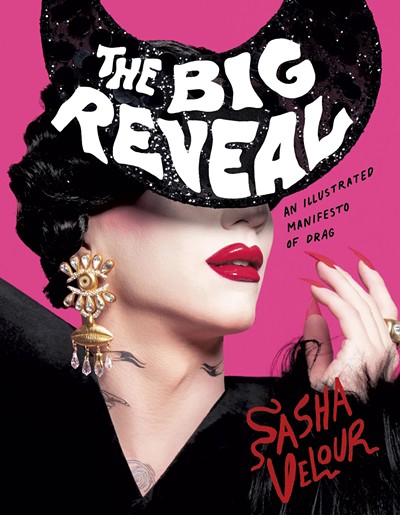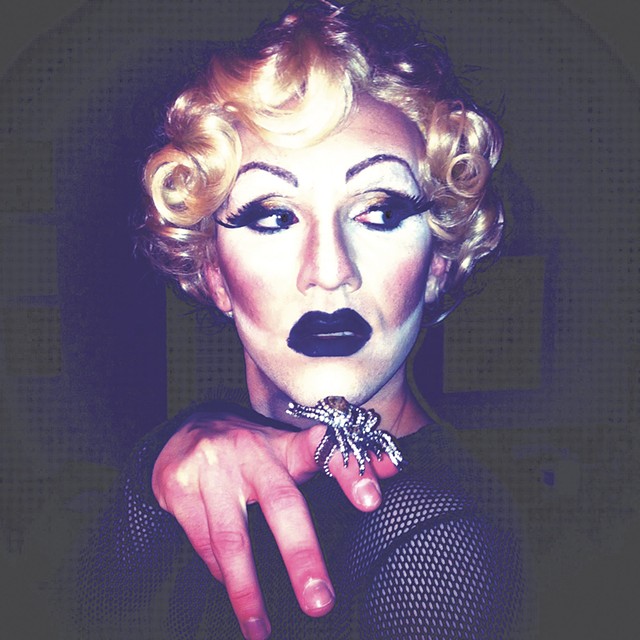
- Courtesy Of Greg Endries
- Sasha Velour
If you know about drag queens, you probably know about Sasha Velour. She won Season 9 of "RuPaul's Drag Race" in 2017, and her final lip-sync to Whitney Houston's "So Emotional," wherein she took off her wig to let loose a shower of rose petals, is remembered as one of the most legendary performances in the show's history. It was a quintessential drag reveal — a staple of ambitious drag performers the queer world over involving tearaway costumes or double wigs.
Velour has hosted NightGowns, a beloved drag revue in Brooklyn, for nearly a decade, and in 2023 she published the graphic novel-cum-memoir-cum-history The Big Reveal: An Illustrated Manifesto of Drag. (Kirkus Reviews called it "an impressive textual and visual display of artistry and courage.") In April, she's joining the Max series "We're Here," which follows drag queens across the country as they stage shows in small towns, To Wong Foo, Thanks for Everything! Julie Newmar-style.
Even if you know about Velour, you might not know about her Vermont connections. She earned an MFA from the Center for Cartoon Studies in White River Junction, which is also where she fell in love with her partner, Johnny, and came into her own as a drag performer. For the first time since she graduated in 2013, she's returning to the area. The Big Reveal Live Show, a touring tie-in to her book that incorporates LGBTQ history, politics and some iconic videos of Velour in drag as a young child, comes to the Flynn in Burlington on Sunday, March 3, and the Lebanon Opera House in Lebanon, N.H., on Monday, March 4.
After a brief and only minimally embarrassing fangirl moment, this Seven Days reporter had a very long phone interview with Velour, who now lives in Brooklyn with Johnny and their Italian greyhound, Vanya. The conversation spanned queer art, the state of LGBTQ rights and just how much maple syrup would have to be involved in a Vermont-themed drag number.
What about the White River Junction and Vermont community helped you hit your stride as Sasha Velour?
I absolutely credit my time in White River Junction with helping all of those threads come together to make Sasha Velour. In fact, I came up with the name in my last month in White River Junction — up until that point, I had been Miss Sasha in all my drag appearances, and I realized I needed a fantastic last name. I had been watching the camp San Francisco drag movie Vegas in Space over and over again, because I had no real internet reception in the Hotel Coolidge, so I had to watch my DVDs. There's a character named Babs Velour that I really loved — even though she's a side character and a kleptomaniac, somehow I related to her.

- Courtesy
- The big Reveal
I was so excited to learn about the Center for Cartoon Studies. I had always loved drawing, even though I was not great at drawing. The way that visuals help people remember really important information and help them understand it on different emotional levels was so interesting to me. When I got to school, I was terrified: What are my completely untrained drawing skills going to be like at this graduate program with people who have been doing art their whole lives? And I felt like I belonged there! The professors really made it clear that anyone with an idea and a message should be using all the tools at their disposal to get it out there. I've kind of applied that belief to my drag, too: You don't need any specific performing abilities to have a place in the spotlight and onstage. What you need is fantasy and follow-through, and you can create something masterful.
I love the graphic novel elements in your book, The Big Reveal. Do you have any lessons that you learned at CCS that carried through to this project?
At CCS, I learned about the importance of the page turn, which, in a way, is the reveal of books. The reader really takes in the entire spread when they turn a page before they start reading it. Understanding the way that your readers or your audience is going to receive something for the first time is the key to putting together something great for them. That translates to, really, all forms of art and communication.
You and Johnny produced your very first drag revue at the Main Street Museum in White River Junction in 2013. Can you tell me a little bit about that show?
Oh, my gosh, sure. So, I had only performed in drag twice prior to this, in the kind of dive bar pageant system that is a weekly event in my hometown [in Illinois]. I had never produced a drag show before, but I did walk around the streets of White River Junction in various forms of drag and basically attracted attention as the only visible drag presence there. The incredible queer community that lived and worked around the Main Street Museum, I was able to connect with them and make friends. And they said, "This would be a space if you want to do a drag show."
I ended up joining forces with a fabulous barista named Celeste, who wanted to be a drag king for the first time, and we wrote a lip-sync musical, with live, spoken dialogue, inspired by All About Eve but all about drag performers. We took it even a few steps further than All About Eve, and they murdered each other at the end. It was really campy, it was really fun, and we did the whole event as a fundraiser for an organization called Tranzmission, which provides books and resources to incarcerated trans people all across the East Coast.
From the beginning, I have really seen drag as this place that we can come together, spread joy, put our creative minds to some use and do some good for the community at large.
Can you give audiences a hint about how the Big Reveal show ties into the Big Reveal book, and what everyone might expect to see?
It started with translating each chapter of the book into a drag number and a different style of reveal. I thought, OK, if this chapter were a reveal performance, would it be a wig reveal? Would it be an emotional reveal? A costume reveal? A set change? Spoiler alert: You get every kind of reveal you could hope for, and then some.
[The show has me] bringing in a little historical reference to the drag, celebrating all the different styles that drag can be — that I tried to outline in the book — bringing a little bit of my own life story to each moment. I thought this was the perfect venue to share some of these unhinged VHS [tapes] of me in drag as a little child. When it all comes together into a drag number, there's just this element of camp and joy and silliness that was really hard to find in the book. I still think the book is funny in its moments, but the gift that drag gives us is stylization. The beauty and intentionality and fantasy ... helps us laugh at our world and appreciate all the surprises, the disasters, for what they are, which is just textures in the gorgeous, revealing tapestry of life.

- Courtesy
- Sasha Velour just starting out in Vermont in 2013
In addition to being campy and humorous and surprisingly political and emotional, there's a strong theme of pop culture in this show, and parodies of pop culture. My drag is very much a reflection of this collage of different pop cultural pieces that somehow have made me the twisted diva that I am today.
Drag performers still face violence and legislative threats, even here in Vermont. On January 6, actually, a Drag Story Hour in White River Junction, hosted by two local performers, Emoji Nightmare and Katniss Everqueer, had to evacuate due to a bomb threat.
I heard about that.
In your book, you talk about practicing drag from a young age. What would it have meant to go to something like a Drag Story Hour when you were a kid?
No one understands the need for Drag Story Hour better than queer adults, because we remember what it was like to be children without any reference points to give us a sense of normalcy. Even in the '90s and early 2000s, when I was growing up, I did not see drag at all. I mean, the first drag queen I saw was RuPaul, on "Sister, Sister" on TV. She certainly was the only type of drag queen I saw, so I thought, OK, I'm not gorgeous and thin and tall, so maybe that's not for me.
To see adults in particular living in all kinds of different ways and being successful, having lives that they're proud of, just showing the freedom to dress however they want — that is a message of possibility for young people that is so valuable. It helps people live; it helps them survive. We need to create a world that is full of acceptance and tolerance, and when people are different, we approach it with curiosity and really want to get to know them and hear them speak. I think that's good for absolutely every child.
What's not good is telling people that certain expressions are so dangerous that they can't even be shown, that they need to be threatened with violence, that they need to be shut down no matter what. That old version of the world makes people want to end their lives; it makes people want to change who they are to fit in; it makes people deeply depressed and not want to leave their homes. That is not what we should be introducing children to, and that is the message of this backlash against drag, and I think it is so shameful. It doesn't match the way I experience most Vermonters, most Americans even, really living their lives. People are so much more progressive than that.
My last couple of questions are just fun.
Yay! We need that!
First: If you had a time machine, when and where would you go, and what historical drag performer would you do a show with?
I'm a really big fan of drag in the late '60s, right around the Stonewall Uprising. There's so much misunderstanding around those early, revolutionary queer events, and people stood up to the police and stood up to the mafia bar owners. I want to know what really happened and see it with my own eyes. I want to talk to Sylvia Rivera and Marsha P. Johnson and find out if they really were at Stonewall and what that whole lifestyle, which sounds pretty radical, pretty punk and queer, really looked like and felt like.
And I also love the '20s and '30s, when drag, across Europe in particular but also in New York City, was the artistic nightlife destination. Drag was really respected in the '20s and '30s, and there's Barbette, who was the Texan aerialist who became a star in Paris. Josephine Baker, of course, who had a kind of drag act of her own. Marlene Dietrich, one of my heroes. I would love to see the reception for drag in that time. Of course, right after, there was a fascist backlash of that time period. So, unfortunately, these things happen in cycles.
Gosh, we keep getting back to the depressing part! Focus on the ostrich feathers flying through the air.
Final question: If I gave you 20 minutes to put together a Vermont-themed quick drag, what would it look like and what song would you lip-sync to?
[Laughs] I would lip-sync to "Moonlight in Vermont," of course, [by] Ella Fitzgerald — the ultimate Vermont song to my mind. It would be nature-centric. There would be some maple syrup ... I think I'd be a tree, and it would involve, you know, tapping me for maple syrup.
This interview was edited and condensed for clarity and length.








Comments
Comments are closed.
From 2014-2020, Seven Days allowed readers to comment on all stories posted on our website. While we've appreciated the suggestions and insights, right now Seven Days is prioritizing our core mission — producing high-quality, responsible local journalism — over moderating online debates between readers.
To criticize, correct or praise our reporting, please send us a letter to the editor or send us a tip. We’ll check it out and report the results.
Online comments may return when we have better tech tools for managing them. Thanks for reading.